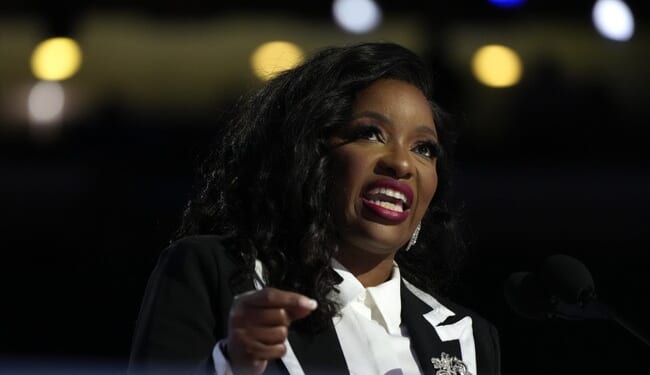
Loving the camera, microphone, and the flavor of the week, U.S. Rep. Jasmine Crockett (D-Texas) speaks with the fury of a courtroom crusader and the confidence of a person who has never once second-guessed herself.
Buried beneath that righteous roar, the Texas congresswoman appears to have played the markets she rails against, albeit quietly.
Recent investigations by Breitbart and The Washington Free Beacon showed that Crockett held stock in at least 25 companies, including those in the pharmaceutical, fossil fuel, and marijuana industries.
The problem?
She never disclosed them during her 2022 congressional run.
Looking at some of the holdings shows something that most Democrats refuse to admit: many are capitalists at heart. The holdings reportedly included ExxonMobil, AstraZeneca, Aurora Cannabis, and Ford Motor Company. While serving in the Texas legislature, she disclosed similar holdings, but when aiming for Capitol Hill, she fell curiously silent.
Reports showed her attempts to break into the marijuana business by opening dispensaries in Ohio. Although the plan fizzled, it also raised an obvious question: how can a sitting member of Congress champion “decriminalization and equity” in cannabis, while privately seeking to profit from the very industry she’s supposed to regulate?
The Stinky Conflicts
Omission is the first problem; financial disclosures are a minimum standard for transparency, and most importantly, they’re not optional.
By deciding to keep quiet about her assets, Crockett created the impression that she knew just how bad the optics were, while hoping nobody’d notice until after the election.
Hypocrisy is the second problem; she publicly attacks fossil-fuel giants for wrecking the planet, while privately owning shares in them. While railing against Big Pharma, Crockett reportedly bought shares in one of the industry’s biggest players. She took a swing at becoming a pot mogul herself after years of moralizing about marijuana justice.
It’s not a complicated pattern: profit when possible, and preach when probable.
A significant percentage of politics is theater, allowing Crockett to play the lead diva, acting bold and loud, convinced that the spotlight is both her calling and birthright. Building her brand as a truth-teller, Crockett treats financial disclosure laws—like stage directions—as helpful suggestions to be ignored if they get in the way of her performance.
The Questions that Matter
Riddle me this: Did Jasmine Crockett knowingly consciously kick under the rug the disclosures she filed as a state legislator—disclosures that seemed to vanish when she ran for Congress? If so, that may suggest she knew the portfolio didn’t match her public persona and chose to hide it until the votes were counted.
Is Crockett leveraging her public platform as a progressive “firebrand” to build private returns on her investments that voters assumed were alien to her mission?
If her outspoken commitment to environmental justice, pharmaceutical reform, and cannabis is sincere, then why does her portfolio read like a different author wrote it?
Would her legislative agenda, her votes, committee choices, and advocacy feel influenced, even subtly, by a private portfolio not initially disclosed? When a member of Congress has private investments in a business sector and publicly critiques or legislates on that sector, their potential conflict of interest is glaring.
Now, here’s the $2 question: Ultimately, how many elected officials are enjoying a similar gap between their public persona and their hidden holdings?
If Jasmine Crockett gets a pass, what’s the message for other congressional members about transparency and accountability in Washington?
A Long Line of “Exceptions”
Jasmine Crockett is hardly the first, nor last, politician to confuse personal opportunity with public duty. Congress has a long and colorful record of bipartisan members treating financial ethics as more of a suggestion than a requirement.
Five senators in the 1980s — the Keating Five — ruined their reputations by pressuring regulators on behalf of a wealthy donor whose savings-and-loan collapsed, costing taxpayers billions; they claimed it was a consulting service. History, however, calls it what it was: corruption.
Jumping forward to 2012, when the STOCK Act (Stop Trading on Congressional Knowledge) was passed after journalists exposed rampant insider trading by lawmakers who seemed to know which sectors were about to boom.
On paper, the act sounded great, but in reality, enforcement has been toothless. Reports still show members delaying filings or ignoring the law entirely, while paying a token fine that wouldn’t cover a D.C. dinner tab.
Now, following after her eyelashes, comes Crockett, who is stepping into a tradition older than most committee chairs: performative outrage paired with profitable silence. She’s evolved into the spiritual successor to every lawmaker who lived the life people in power enjoy, only with more flamboyance.
Ethics isn’t what separates her from earlier offenders; it’s her attitude. She doesn’t even try to hide behind contrition, defending herself with the swagger of a celebrity scolding a fan for the temerity of asking about the prenup.
It’s this kind of arrogance that does more than offend; it corrodes, because each time a congressional critter skates around disclosure rules, another American can only shrug and lose even more faith in the representation they receive in Washington.
Crockett’s story isn’t anything new; it’s the latest episode in the long-running series called Ethics for Thee, Exceptions for Me.
Final Thoughts
Despite her ego, Crockett isn’t unique; she’s just the latest reminder of how far the political rot has spread. Playing by her own script avoids the same rules and penalties ordinary Americans would incur, but such trivialities as these barely muss her hair.
Corporate fraud results in a frog-march, while in D.C. it’s called “oversight.”
The part that truly burns is the fact that she won’t face any real consequences, and she knows it. Politicians have long since perfected the required dance: pocketing their contradictions and waltzing straight past accountability, collecting donations with one hand and dividends with the other.
The only thing rarer than a person with integrity in Congress is a journalist from the old guard willing to expose it.
Breitbart and the Beacon performed the duty that journalism today has long forgotten: being the watchdog, digging for information, and naming names.
Imagine a time when legacy outlets, believing that truth matters, join forces with new media. We’d see more curtains pulled back with fewer photo ops.
Quoting the legendary Bill Murray, “Human sacrifice, dogs and cats living together… MASS HYSTERIA!”
But that’s a pipe dream in the shape of a moth being swatted away by the rapid blinking of large, fake eyelashes, each flutter fanning the illusion that accountability still exists.
Exists, somewhere buried deep beneath the Capitol’s marble glare.
Why Transparency Still Matters
At PJ Media, we don’t chase the same headlines as legacy media—we chase what they ignore. When the powerful pretend that ethics rules are for everyone else, we call it out, receipts and all.
Join our VIP community for unfiltered columns, behind-the-scenes reporting, and analysis the corporate press won’t touch. Help us expose the truth—sign up with promo code POTUS47 for 74% off your VIP membership.








